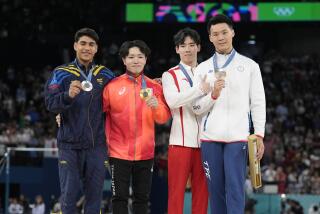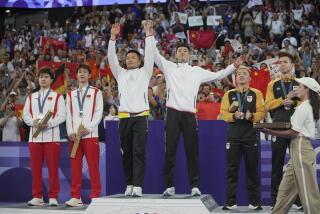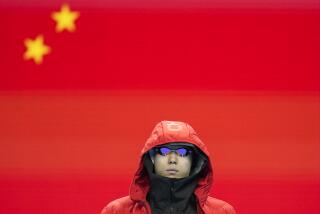Olympic organizers playing host to political games too
- Share via
BEIJING — Every four years, the Summer Olympics give the world not only a display of human athletic achievement but also a chance to assess the ebbs and flows of the globe’s most intractable diplomatic problems.
Where do you put the rival Koreas in the opening ceremony? How do you refer to Taiwan? What happens if Arab athletes refuse to compete with the Israelis? Many of the same issues rear their ugly heads every time, sprouting like noxious quadrennial weeds.
A feature of the 2008 Olympics is that delegations will march according to the number of pen strokes used in writing the Chinese characters of their names, tossing the customary alphabetical order to the wind. This traditional Chinese method of ordering names will put Australia, which starts with a character taking 15 strokes, near the end of the procession, and Yemen, at three strokes, close to the beginning.
The North Koreans were furious that their country name in Chinese would trail just behind South Korea.
It was irrelevent for the last two Summer Olympics. In 2000 in Sydney and in 2004 in Athens, the Koreans marched together holding a blue-and-white flag symbolizing a unified Korea.
As for its own rival, Taiwan, China has been keen to show itself as the magnanimous Olympic host and a responsible global leader. Two high-ranking officials of Taiwan’s ruling Nationalist Party, which was defeated by China’s Communists in 1949, have been invited as guests of President Hu Jintao. A Taiwanese dance troop is expected to perform as well.
China also made a small but significant change in the way it refers to Taiwan. It agreed to use the name Zhonghua Taipei, or “Chinese Taipei,” a reference to Taiwan’s capital, instead of Zhongguo Taipei, which is traditionally used by mainland Chinese and could be translated as “China’s Taipei.”
“China has handled this issue much better than expected. Nobody thought Beijing would be so flexible,” said Chong-pin Lin, president of the Foundation on International and Cross-Strait Studies in Taiwan. “The pro-independence advocates have found much less to make a big issue about.”
Which is not to say nobody will make a fuss.
Going strictly by the number of strokes, Taiwan would have gone next to Hong Kong (Zhongguo Xianggang), which has its own delegation even though it has been under Chinese sovereignty as a special administrative region since 1997. Rather than imply that Taiwan too is part of China, Beijing will put the Central African Republic (Zhongfei) in between them as a buffer. (The character zhong means central or middle.)
The order in which the delegations will march is to be announced today, Olympic officials said. China, as the host, will go last, and Greece, where the games originated, will go first.
Many other problems have resolved themselves. The world’s newest nation, Kosovo, will not have a delegation. Iraq managed to resolve a dispute with the International Olympic Committee, which had threatened a ban because of Iraq’s disbanding of its national committee.
The 2004 Olympics in Athens were disrupted when an Iranian judo competitor refused to compete against an Israeli.
Herb Weinberg, an Olympic historian based in Colorado, said that this year the Olympic organizers probably would try to arrange the competition to avoid having the Israelis in direct matches against athletes from countries likely to cause another crisis.
“Every Olympics has new issues,” Weinberg said. “The IOC always says they will be as nonpolitical as possible, but somebody always tries to use the Games for political purpose.”
The largest political issue at the 2008 Olympics is China itself, its human rights record at home and abroad. But threats to boycott have largely fizzled. At last count, more than 100 foreign leaders, many of them heads of state or government, were expected to attend the games, including President Bush. French President Nicolas Sarkozy, who initially suggested that he would stay away over China’s Tibet policy, is to attend the opening ceremony after all.
--
More to Read
Go beyond the scoreboard
Get the latest on L.A.'s teams in the daily Sports Report newsletter.
You may occasionally receive promotional content from the Los Angeles Times.






